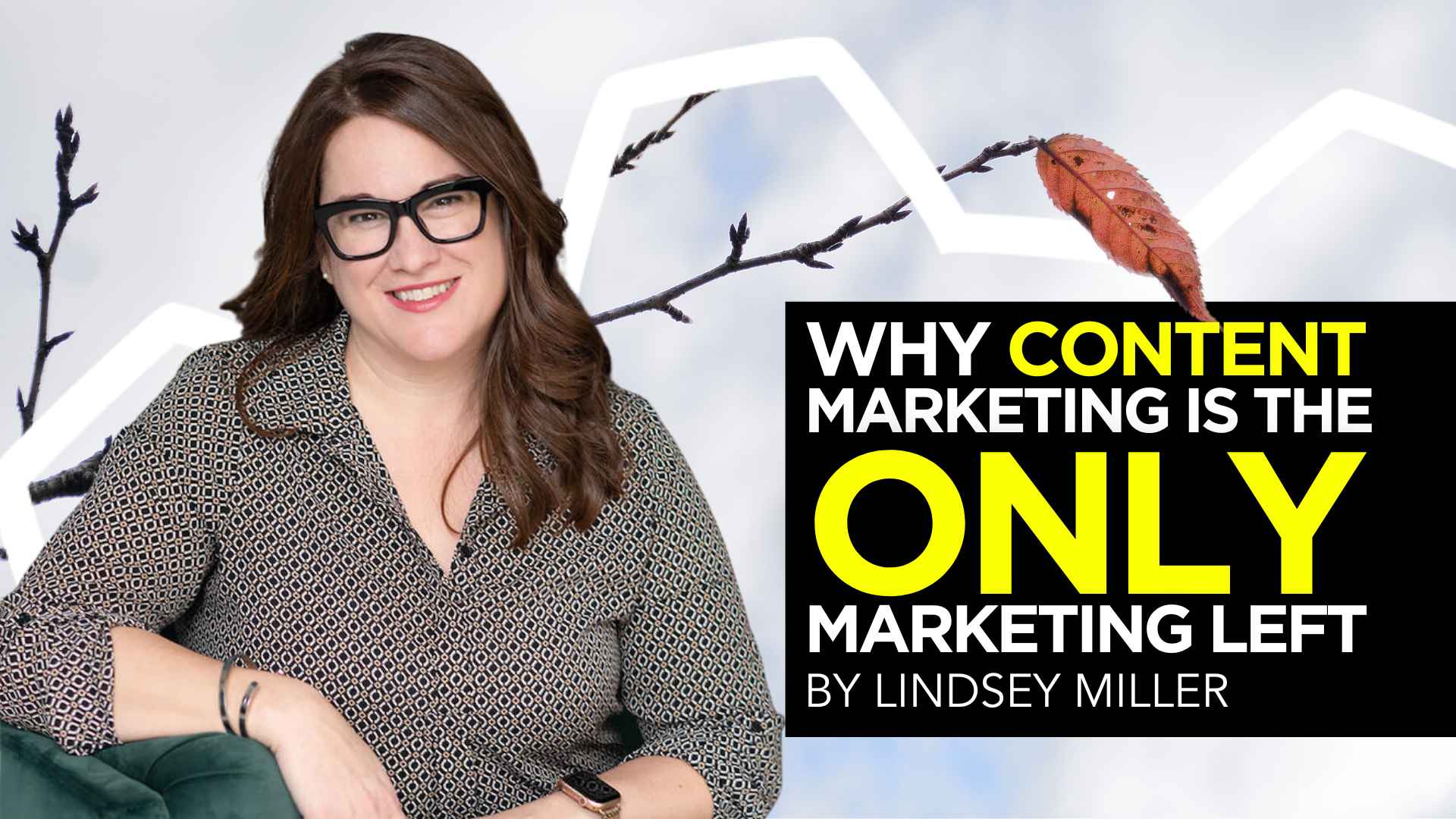MARKETING
Why Content Marketing is the Only Marketing Left


With more people using ad-blocking software to shut out unsolicited ads, the future looks bleak for marketers. But content marketing is the silver lining. And there are many reasons why the future is bright.
Traditional marketing relies on outbound systems. It’s about reaching out to consumers to interest them in your product. This approach subjects consumers to marketing messages they don’t want.
Content marketing is inbound. It’s about creating and sharing content that helps consumers achieve their goals without asking for anything in return. Who can say no to free help?
Consumers can now research their challenges online, increasing content’s value. When you share information that helps consumers live better, they will keep coming back for more. And when they need a product or service you deal in, they’ll naturally choose you over your competitors.
What’s the Purpose of Content Marketing?
The purpose of content marketing depends on the brand and where the consumer is in their customer journey. Here are some of the things content marketing does.
Gives Consumers Information They Need
The right content can help clarify a consumer’s thoughts so that they can make an informed decision. Regardless of the content type, the goal should be to feed your audience the information they need to get out of a jam or crush a milestone. Do this long enough, and your audience will see your brand as a source of truth.
Creates Brand Awareness
Content marketing increases your reach. Consistently sharing your knowledge and resources will improve awareness of your brand.
Some consumers of your content will share your posts with their family and friends. Some will share them on their social media channels and in their communities.
Brand awareness is your first step toward converting prospects because nobody buys from a brand they don’t know.
Generates Interest in Your Brand and Products
Many entrepreneurs expect the world to jump at their businesses when they launch. But your business won’t get traction if you don’t work to generate interest around it. Content marketing gives you the power to do that.
While sharing content that makes life better for your audience, find natural opportunities to show how your products or services will help them achieve their goals.
Inspires Audience Engagement
Once you start sharing valuable content on your blog, social media, or newsletter, responses will follow. While not everyone will agree with what you post, sharing your knowledge will engage your audience, which keeps your brand top of mind.
Increases Sales
Once your content marketing strategy and execution are effective, it’s only a matter of time before the attention you’re garnering starts translating into sales. The more people know and engage with your brand, the more value they’ll attach to your content, and the more likely they’ll be to buy from you.
Why is Content Marketing So Important?
Content marketing is vital to brands for various reasons, depending on your business’s needs and how you choose to use content. Here are some of the reasons content marketing is important for brands.
Customers Want It
Consumers are no longer satisfied with just sales-specific information. Traditional marketing gives the customers just enough information to get them to buy a product or service. Content marketing gives consumers the information they need to choose who to buy from and why. Customers want information that helps them make informed purchases.
Builds Trust and Loyalty
You don’t earn customer trust and loyalty by telling them how trustworthy you are. You need to show it with content that demonstrates your brand authority, trustworthiness, and subject-matter expertise. High-impact content takes customers from where they are to where they want to be. It informs, educates, and entertains them.
Creates Brand Awareness
Your prospective customers need to know your business exists for you to have a fighting chance at conversion. Content marketing is your chance to do that in a non-invasive way. Your brand personality and values will naturally shine through when you create content on topics relevant to your customers. That will give you more publicity.
Tells You About Your Audience
Content marketing sets you up to know more about your audience in new ways. First, you’d want to understand what, where, when, and how they consume information. Then, while sharing content, you’ll be able to know what your audience likes to read, listen to, or watch by analyzing your readership data. This information will help you understand their interests and empower you to improve your product.
Drives Traffic to Your Site Through SEO
Optimizing your blog content allows search engines (like Google) to find and serve your content to your audience. This aids search visibility.
A HubSpot survey found that businesses with SEO-optimized blog content get 55% more visitors, making their marketing team leaders 13 times more likely to achieve a good ROI.
Generates High-Intent Leads
Content serves up leads that are more likely to become paying customers. They don’t struggle to understand how your brand, its products, and its values fit into their lives. They already know because they’ve consumed your content. And content marketing enables you to write SEO-optimized bottom-of-the-funnel (BOFU) content that targets people ready to buy a product or service.
Affordable for Small Businesses
Content marketing is cheaper than paid ads. You can also get significant results even if you start small. Unlike paid advertising, which depends on how much money you can throw into it, content marketing levels the playing field.
Why is Content Marketing the Only Form of Marketing Left?
Today’s consumers are much more focused on themselves and what’s good and valuable to them. That’s why interruption tactics no longer work. The focus on information when, where, and how the customer wants it is just one reason content marketing is the only form of marketing left. There are some other reasons too.
Most Consumers Use Mobile Devices
Consumers call the shots, so the best marketing efforts must meet them where they are.
One in every five people spends more than 4.5 hours daily on their phones. Add that to their sleep and work hours, and you’ll see why people don’t have time for TV or other traditional media.
When people are on their phones, they aren’t looking to be marketed to. They’re looking for valuable content that helps them navigate their daily challenges.
Consumers Search and Shop Online
With the rise of digital media, consumers shop more online than ever before. They research the products they want to buy from the comfort of their homes. They avoid the stress of travel and people associated with brick-and-mortar stores and can make purchasing choices as they research every step.
Your Search Visibility and Traffic Depend on Content
Helpful content gets search engines to notice and present your website content to people looking for the products or services you provide. Be sure to balance the creative with the scientific. You need high-quality content to give your readers a good user experience. But you also need to optimize your content for search engines to serve it to those looking for it.
Millennials Are Tech-Reliant
Millennials (consumers born between 1981 and 1996) are the largest demographic, and they make most of their purchases online. These factors make it easy for content marketers to get their attention since content marketing relies on technology.
Trust is Increasingly Important
Consumers are overwhelmed with marketing messages. Your brand needs to stand out with content that earns their trust quickly. Because when it comes down to it, only brand trust and authority will separate your claims from those of a random brand. It will give your prospects a solid idea of what your product does and how it works, which will reduce their doubts.
Legacy Media are Becoming Obsolete
The rise of digital content has crippled traditional media. Audiences now prefer the convenience of consuming digital content over traditional media. And because attention is the currency in marketing, the money will go wherever the audience goes.
What are the Best Content Marketing Methods?
There are various content marketing methods, so the mix you use is up to you. It’s all about what works best for your brand and audience. But some methods seem important for every business to use on some level.
Content marketing methods that benefit most businesses are:
- Websites. Websites are ideal for sharing information that helps your audience while informing them about your product or service and letting you buy directly from the site. Your website is part of your owned media, and the audience you build there is yours for as long as you want. As a distribution channel, websites can host all types of content — text, images, audio, and video, allowing you to share content that appeals to more people.
- SEO-Optimized Blogs. Your potential and existing customers are looking for answers to their questions, and search engines have become their trusted sources of information. Consumers run 8.5 billion searches on Google alone every day. You will attract customers with SEO-optimized content.
- Lead Magnets. Lead magnets are free resources potential customers can get in exchange for their contact information. Marketers use them to lure prospective customers into their email lists, where they can then nurture them into customers. Your lead magnet could be a tutorial, e-book, workbook, or industry report. In any case, be sure your lead magnet is specific, promises your audience a quick win, and solves a real problem for them.
- Email. If you follow the “email is dead” bandwagon, you’ll miss out on the chance to earn $36 from every $1 you spend. Email is as alive as it gets. This content marketing method is particularly effective for lead nurturing. That’s because it allows you to send personalized emails directly to your audience’s inbox. This approach allows you to address their specific pain points and aspirations.
Conclusion
Content marketing results ultimately depend on your strategy, budget, and nature of business. But you can never go wrong with content marketing investments. Regardless of your industry, your existing and potential customers have loads of questions and challenges they need answers to on an ongoing basis. If your content can help them, they’ll grow to trust you, buy from you, and become loyal to your brand.

















You must be logged in to post a comment Login